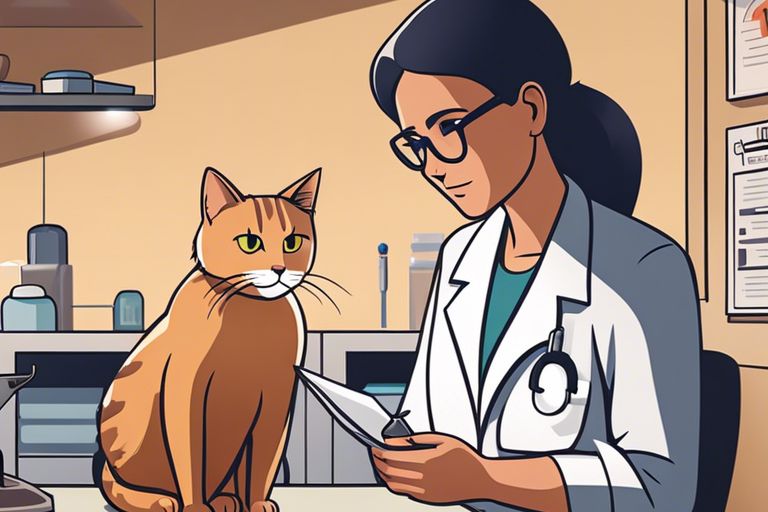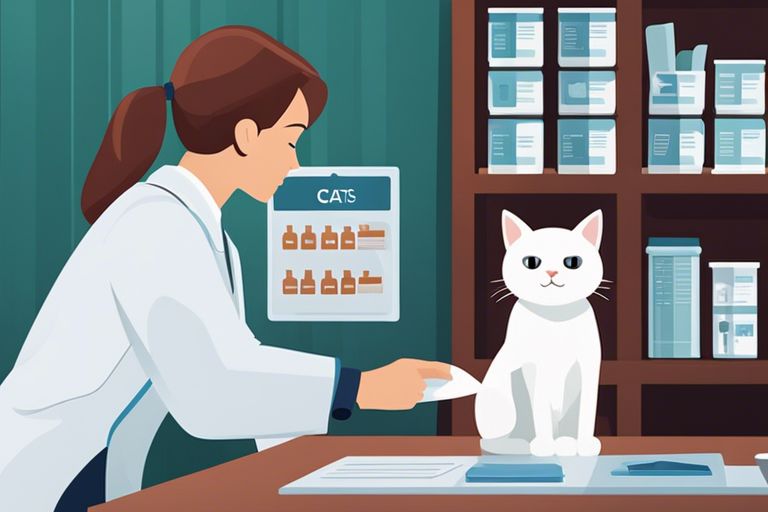Have you ever wondered what you would do if your feline friend ingested something toxic? Poisoning in cats can occur from various household items, plants, and even human medications. It’s important to be able to recognize the signs of poisoning in cats and to know how to take immediate action to treat and potentially save their lives. In this blog post, you will learn the symptoms of poisoning in cats, common household toxins to watch out for, and the steps you should take if you suspect your cat has been poisoned. Your quick response and knowledge could make all the difference in your cat’s recovery.
Key Takeaways:
- Know the signs: Look out for symptoms such as vomiting, diarrhea, lethargy, loss of appetite, and difficulty breathing which may indicate poisoning in cats.
- Contact a vet immediately: If you suspect your cat has been poisoned, seek professional help from a vet right away for proper diagnosis and treatment.
- Identify the poison: It’s important to provide the vet with information on any potential toxins your cat may have been exposed to, such as household chemicals, plants, or medications.
- Follow vet’s instructions: Administer any prescribed treatments and follow the vet’s recommendations for monitoring your cat’s condition following poisoning.
- Prevention is key: Take proactive measures to pet-proof your home and keep dangerous substances out of reach to prevent future cases of poisoning in cats.
Recognizing Poisoning in Cats
Assuming you suspect that your cat may have been poisoned, it is crucial to be able to recognize the signs and symptoms of poisoning in cats. Recognizing poisoning in cats can be challenging, as the symptoms can vary widely depending on the type of poison and the amount ingested. However, being able to identify the warning signs of poisoning can mean the difference between life and death for your cat.
Symptoms of Poisoning
Some of the most common symptoms of poisoning in cats include vomiting, diarrhea, lethargy, drooling, difficulty breathing, seizures, and loss of appetite. If you notice any of these symptoms in your cat, it is important to seek veterinary care immediately. Keep in mind that the symptoms of poisoning may not be immediately apparent, so it is important to monitor your cat closely for any signs of unusual behavior or distress.
Differentiating Between Types of Poisons
When it comes to poisoning in cats, it is important to be able to differentiate between the different types of poisons that could potentially harm your pet. Some common poisons that can affect cats include household chemicals, plants, medications, and certain human foods. If you suspect your cat has been poisoned, it is essential to try to identify the source of the poison in order to provide the most effective treatment. Any delay in seeking treatment can worsen your cat’s condition and may even lead to fatal consequences.
- Household chemicals: Cleaning products, antifreeze, and pesticides
- Plants: Lilies, azaleas, and rhododendrons
- Medications: Over-the-counter drugs, prescription medications, and topical ointments
- Human foods: Chocolate, grapes, and onions
Any delay in seeking treatment can worsen your cat’s condition and may even lead to fatal consequences.
When to Seek Immediate Veterinary Care
If you suspect that your cat has been poisoned, it is crucial to seek immediate veterinary care. Do not wait for symptoms to worsen, as poisoning can quickly become life-threatening for your cat. Even if you are unsure whether your cat has been poisoned, it is better to err on the side of caution and seek professional help. Your veterinarian will be able to conduct tests and provide the appropriate treatment to help your cat recover from poisoning.
Common Household and Environmental Poisons
Not all toxins that can harm your cat are found in the form of chemicals or medications. In fact, many common household items and environmental substances can pose a threat to your feline friend. It’s important to familiarize yourself with these potential hazards in order to keep your cat safe.
Foods Toxic to Cats
When it comes to foods that are toxic to cats, there are several items that you should be aware of. Chocolate, onions, garlic, grapes, and raisins are just a few examples of human foods that can be extremely harmful to cats. Additionally, certain artificial sweeteners such as xylitol can also be toxic. It’s essential to keep these foods out of reach of your cat and to be cautious of what you are offering them to eat.
Plants and Flowers Harmful to Cats
Many common plants and flowers can be toxic to cats if ingested. Lilies, tulips, daffodils, and azaleas are just a few examples of beautiful but potentially dangerous plants to your feline friend. Even smaller ingestions of some plants can cause severe illness or even prove to be fatal, so it’s crucial to keep these out of your cat’s environment.
Other Household Items and Chemicals
In addition to food and plants, various household items and chemicals can also pose a threat to your cat. Household cleaners, antifreeze, medications, and certain essential oils are just a few examples of substances that can be harmful to your pet. It’s important to store these items securely and out of your cat’s reach, and always be cautious when using them around your feline friend.
Treatment of Poisoning in Cats
To effectively treat poisoning in cats, it’s crucial to act quickly and seek appropriate treatment. There are various treatment options available, depending on the type of poison and the severity of the cat’s condition. The treatment typically involves first aid and home care, veterinary interventions and treatments, as well as long-term management and recovery.
First Aid and Home Care
If you suspect your cat has been poisoned, the most important first step is to remove the source of the poison and contact your veterinarian immediately. Until you can get professional help, keep your cat calm and try to prevent them from grooming themselves, which can further spread the toxic substance. Do not attempt to induce vomiting without veterinary guidance, as it can be dangerous and may do more harm than good. Once you have contacted your veterinarian, follow their instructions carefully and monitor your cat closely for any changes in behavior or symptoms.
Veterinary Interventions and Treatments
When you take your cat to the veterinarian, they will conduct a thorough examination and may administer activated charcoal or other medications to help neutralize and eliminate the poison from your cat’s system. In more severe cases, your cat may require hospitalization for supportive care, such as intravenous fluids, oxygen therapy, or other treatments to address specific symptoms or complications. Depending on the type and severity of the poisoning, your veterinarian will tailor the treatment plan to your cat’s individual needs.
Long-Term Management and Recovery
After the initial treatment, your veterinarian may recommend long-term management strategies to support your cat’s recovery. This can include follow-up appointments for continued monitoring, dietary changes, or additional medications to address any lingering effects of the poisoning. It’s important to follow your veterinarian’s recommendations closely and provide a safe, toxin-free environment for your cat to prevent future incidents. With prompt and appropriate treatment, most cats can make a full recovery from poisoning, but it’s essential to be vigilant and proactive in safeguarding your cat’s well-being.
Prevention and Safety Measures
Keep your cat safe from poisoning by being aware of the common poisons that can be harmful to them. To learn more about poisons in cats, you can read this article on Poisons in Cats. Educating yourself on the potential dangers your cat may encounter is the first step in preventing poisoning.
Safe Proofing Your Home
When it comes to keeping your cat safe from poisoning, it’s essential to take proactive measures in and around your home. This includes securely storing household chemicals, cleaning products, medications, and toxic plants in places that are inaccessible to your cat. Consider using cabinet locks and keeping items on high shelves. Additionally, be mindful of dangerous items outside, such as antifreeze, and ensure they are stored out of reach.
Educating Others About Cat Safety
Ensuring the safety of your cat also involves educating others who may come into contact with your pet. This includes family members, friends, and houseguests. Make sure they are aware of the potential hazards and the importance of being cautious around your cat. Educating others about cat safety can help prevent accidental poisoning and ensure a safe environment for your pet.
Remember, prevention is key when it comes to protecting your cat from poisoning. By implementing these safety measures and educating yourself and others, you can create a safer environment for your feline friend.

Recognizing and Treating Poisoning in Cats
Taking this into account, it is crucial for you to be able to recognize the signs of poisoning in your cat in order to provide immediate treatment. Some common symptoms of poisoning in cats include vomiting, diarrhea, difficulty breathing, seizures, and disorientation. If you suspect that your cat has been poisoned, it is important to contact your veterinarian immediately. They can provide the necessary treatment and advise you on the best course of action. Do not attempt to induce vomiting or administer any medications without professional guidance, as this can do more harm than good. Remember to keep your home free of poisonous substances and always monitor your cat’s environment to prevent any potential poisoning incidents.
FAQ
Q: What are the signs of poisoning in cats?
A: Common signs of poisoning in cats include drooling, vomiting, diarrhea, difficulty breathing, seizures, tremors, and weakness. Additionally, your cat may display dilated pupils, lack of coordination, and decreased appetite. If you suspect your cat has been poisoned, seek immediate veterinary attention.
Q: How can I treat poisoning in cats at home?
A: It is crucial to seek professional veterinary help immediately if you suspect your cat has been poisoned. Attempting to treat poisoning at home can be extremely dangerous and may worsen the situation. If your veterinarian advises you to do so, you may need to administer first aid, such as inducing vomiting or applying activated charcoal, but only as directed by a professional.
Q: What are common sources of poisoning for cats?
A: Common sources of poisoning in cats include household items such as certain plants (lilies, for example), human medications (such as acetaminophen or ibuprofen), insecticides, rodenticides, household cleaners, and certain foods (such as chocolate, grapes, and onions). Additionally, outdoor cats may encounter poisonous plants, chemicals, or other toxic substances in the environment. It is crucial to be aware of potential sources of poisoning and keep them out of your cat’s reach.

Jayley, a devoted cat enthusiast, also writer for other cat blog as well. She aims to dedicated to providing comprehensive information, insights, and advice on everything you’d ever want to know about our whiskered companions.
